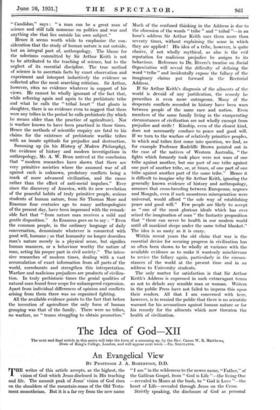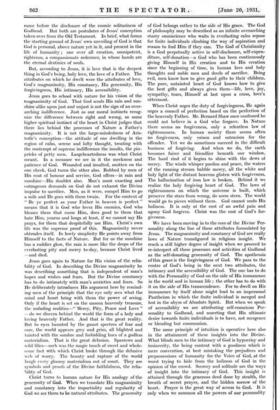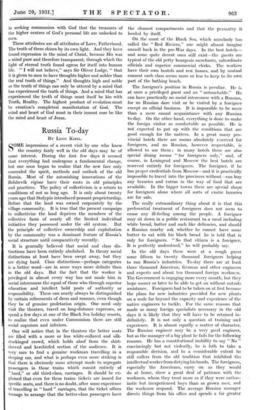The Idea of God XII The next and final article
in this series will take the form of a summing up, by the Rev. Canon W. B. Matthews, Dean of King's College, London, and will appear next week.—ED. SPEcreron.
An Evangelical View
BY PROFESSOR J. A. ROBERTSON, D.D.
THE writer of this article accepts, as the highest, the vision of God which Jesus disclosed in His teaching and life. The summit peak of Jesus' vision of God rises on the shoulders of the mountain-mass of the Old Testa- ment monotheism. But it is a far cry from the new name " I am " in the wilderness to the newer name, " Father," of the Galilean Gospel, from " God is Life "—the living One —revealed to Moses at the bush, to " God is Love "—the heart of Life—revealed through Jesus on the Cross.
Strictly speaking, the disclosure of God as personal came before the disclosure of the cosmic solitariness of Godhead. But both are postulates of Jesus' conception taken over from the Old Testament. In brief, what forms the starting ground of Jesus' own unveiling of God is that God is personal, above nature yet in it, and present in the life of humanity ; one over all creation, omnipotent, righteous, a compassionate redeemer, in whose hands are the eternal destinies of souls.
But, according to. Jesus, it is love that is the deepest thing in God's being, holy love, the love of a Father. The attributes on which he dwelt were the attributes of love, God's magnanimity, His constancy, His generosity, His forgivingness, His ,intimacy, His accessibility.
Jesus goes to school with nature for his vision of the magnanimity of God. That God sends His rain and sun- shine alike upon just and unjust is not the sign of an over- arching indifference. Just as our moral instincts recog- nize the difference between right and wrong, so some higher spiritual instinct of the heart in Christ judges that there lies behind the processes of Nature a Father's magnanimity. It is not the large-mindedness of Aris- totle's conception—the attitude of one dwelling in the region of calm, serene and lofty thought, treating with the contempt of supreme indifference the insults, the pin- pricks of petty men. Largeheartedness was what Christ meant. In a measure we see in it the meekness and patience of God. Wounded and insulted, smitten on the one cheek, God turns the other also. Robbed by men of His coat of honour and service, God offers—in rain and sunshine—His doublet also. Man's most exacting and outrageous demands on God do not exhaust the Divine impulse to sacrifice. Men, as it were, compel Him to go a mile and He goes with them twain. For the context of " Be ye perfect as your Father in heaven is perfect " means that it is God who loves His enemies, God who blesses them that curse Him, does good to them that hate Him, yearns and longs at least, if we cannot say He prays, for them that despitefully use Him. Christ's own life was the supreme proof of this. Magnanimity never obtrudes itself. In lowly simplicity He points away from Himself to the facts. of Nature. But for us the sunshine has a ruddier glow, the rain is more like the drops of the everlasting pity and mercy to-day, because Christ lived —and died.
Jesus goes again to Nature for. His vision of the relia- bility of God. In describing the Divine magnanimity he was describing something that is independent of man's hopes and wishes and fears. But the Divine constancy has to do intimately with man's anxieties and fears. So He deliberately introduces His argument here by remind- ing men of the principle that the eye only sees what the mind and heart bring with them the power of seeing. Only if the heart is set on the unseen heavenly treasure, the unfading. realities—" Mercy, Pity, Peace and Love " —do we discern behind the world the form of a holy and loving heavenly Father. And that is the great reality. But to eyes haunted by the gaunt spectres of fear and care, the world appears grey and grim, all blighted and tainted with the sombre and forbidding hues of a godless materialism. That is the great delusion. Sparrows and wild lilies—such was the magic touch of sweet and whole- some fact with which Christ broke through the delusive web of worry. The beauty and rapture of the world laugh every gloomy materialism out of court. They are symbols and proofs of the Divine faithfulness, the relia- bility of God.
Christ turns to human nature for His analogy of the generosity of God. When we translate His magnanimity and constancy into the impartiality and regularity of God we see them to be natural attributes. The generosity of God belongs rather to the side of His grace. The God of philosophy may be described as an infinite overarching starry omniscience who waits in everlasting calm repose for finite individuals climbing the way of aspiration and reason to find Him if they can. The God of Christianity is a God perpetually active in self-disclosure, self-expen- diture, self-donation—a God who has been continuously giving Himself in His creation and to His creation since the beginning of time, in human love and holy thoughts and noble men and deeds of sacrifice. Being evil, men know how to give good gifts to their children. The pure, untainted heart of God knows how to give the best gifts and always gives them—life, love, joy, sympathy, tears, Himself at last upon a cross, love's uttermost.
When Christ urges the duty of forgivingness, He again urges a council of perfection based on the perfection of the heavenly Father. Mr. Bernard Shaw once confessed he could not believe in a God who forgave. In Nature there seems no forgiveness, only a relentless law of righteousness. In human society there seems often no forgiveness, only nrison and ostracism for the offender. Yet we do sometimes succeed in the difficult business of forgiving. And when we do, the earth becomes fairer and friendlier beneath our window. The hard rind of it begins to shine with the dews of. mercy. The winds whisper pardon and peace, the waters of the running stream babble mercy, all the white and holy light of the distant heavens glisten with forgiveness. The hallucination of iron law is broken. Behind it we realize the holy forgiving heart of God. The laws of righteousness on which the universe is built, which preserve the stars from wrong, do seem stern. The world would go to pieces without them. God cannot undo His holiness. It is only at the cost of an awful pain and agony God forgives. Christ was the cost of God's for- giveness.
We have been moving in to the core of the Divine Per- sonality along the line of these attributes formulated by Jesus. The magnanimity and constancy of God are really laws of Nature transfigured in religious insight. We reach a still higher degree of insight when we proceed to re-interpret all these processes and activities of Godhead as the self-donating generosity of God. The apotheosis of this grace is the forgivingness of God. We pass to the centre of God's being in the next two attributes, the intimacy and the accessibility of God. The one has to do with the Personality of God on the side of His immanence in the world and in human life ; the other has to do with it on the side of His transcendence. For to dwell on His immanence by itself alone might lead to an impersonal Pantheism in which the finite individual is merged and lost in the abyss of Absolute Spirit. But when we speak of accessibility we are attributing self-conscious Per- sonality to Godhead, and asserting that His ultimate desire towards finite individuals is to have, not mergence or blending but communion.
The same principle of intuition is operative here also in the attainment of these insights into the Divine. What blinds men to the intimacy of God is hypocrisy and insincerity, the being content with a goodness which is mere convention, at best mistaking the prejudices and prepossessions of humanity for. the Voice of God, at the worst trying to hide from the holiness of God in the opinion of the crowd. Secrecy and solitude are the .ways of insight into the intimacy of God. This insight is attained through the generous deed done by stealth, the breath of secret prayer, and the hidden sorrow of the heart. Prayer is the great way of access to God. It is only when we summon all the powers of our perionality in seeking communion with God that the treasures of the higher Centres of God's personal life are unlocked to men. • These attributes are all attributes of Love; Fatherhood. The truth of them'shines by its own light. And they have found elpression in the mind of Christ, because His was a mind pure and therefore transparent, through which the light of eternal truth found egress for itself into human life. " I will not believe," says Sir Oliver Lodge, " that it is given to men to have thoughts higher and nobler than the teal truth of things." And thoughts high and noble as the truth of things can only be uttered by a mind that has experienced the truth of things. And a mind that has experienced the truth of things must itself be kin with Truth, Reality. The highest product of evolution must be creation's completest manifestation of God. The mind and heart of God must in their inmost core be like the mind and heart of Jesus.












































 Previous page
Previous page